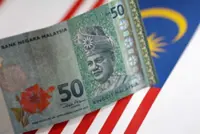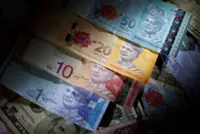PETALING JAYA: With the ringgit hitting new lows, even reaching RM4.80 to the US dollar recently, Malaysians are anxious about what lies ahead.
With such a weak ringgit – it was trading at US$4.77 yesterday – they said the upcoming Ramadan and Hari Raya celebration would be a challenge.
The increase in the sales and services tax (SST) from 6% to 8% has also made things worse.
Small clothing store owner Zaleha Zaid, 46, said her family has put off their yearly tradition of distributing dates during the Ramadan month.
“We usually get a truckload of dates to distribute to mosques, orphanages and people we know but it will be too costly to do so this year.
“We will probably just invite them for buka puasa at our house. That’s all we can afford this year.
“Business is not good either. Usually, I would get a lot of customers two or three months before Ramadan but this year, the store is almost empty even with the fasting month only a couple of weeks away,” she said.
A 36-year-old marketing manager at a local firm, Danial Hashim, said he would have to break his promise of taking his children to Europe for a holiday this year.
“We simply cannot afford to spend our savings on a holiday in Europe. We need the savings for any eventuality.
“Everything has gone up except our salaries. In March, we have to pay more because of the increased SST.
“I had actually two bookings for hotels in Europe but my wife and I decided to not go ahead with the plan. We would lose a few hundred ringgit for cancellation than spend tens of thousands of ringgit in Europe.
“We will probably go on a holiday in Malaysia instead. We are thinking of Semporna in Sabah,” he said.
An analyst who only wanted to be known as Mawar, 32, has decided to travel to Asean countries like Thailand, Indonesia or Vietnam with her family during the Raya break.
“Even then, the ringgit is weaker compared to some of these countries’ currencies like the Thai baht and I have to fork up more, especially for basic expenses like food.
One ringgit can now only fetch 7.53 Thai baht, a far cry from the heydays of 2010 when a ringgit was worth 10 baht.
“Because of our weak currency, I honestly cannot set my mind on travelling to another destination other than Hatyai, where I went twice last year.
“Everything is cheaper there, compared to Malaysia such as food, hotels and transport,” Mawar said.
Nurul Aida Mohammed Zafir, 25, holds a BSc majoring in animal science and management from the University of Melbourne.
But she is working part-time at an ice cream store to save up for her stay in Australia.
“It helps a lot and some of the savings will mostly be used for my graduate visa application on top of the allowance given by my family.
“The visa itself costs A$1,895 (RM6,500). It is expensive for just a visa and using the money I earned from my part-time job seems cheaper than converting the currency.
Nurul Aida, who is hoping to get a job in Melbourne soon, said she decided to return to Malaysia to complete her pre-employment requirements such as taking an English proficiency test and undergoing a medical checkup as the weak ringgit meant that it would be too expensive to do them in Australia.
“I will need funds just to settle my graduate visa, medical checkup and English test requirements, and on top of that, I have to prepare for house rent and cost of living in the first few months.
“The Malaysian ringgit is too weak to support the cost of my preparation itself. The cost of living is harder, with rental at A$500 to A$900 (RM2,381.50 to RM4,286.70) per month,” said Nurul Aida.
“That is why after I return to Melbourne, I will probably continue doing my part-time job while waiting for a full-time job related to my field which is animal science,” she said, adding that she would need around RM4,800 for her expenses in Australia monthly.






